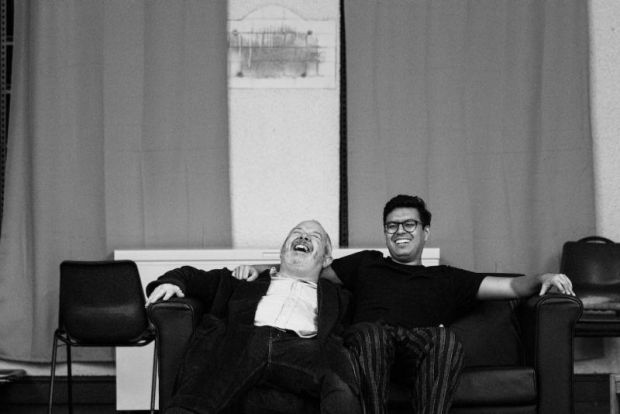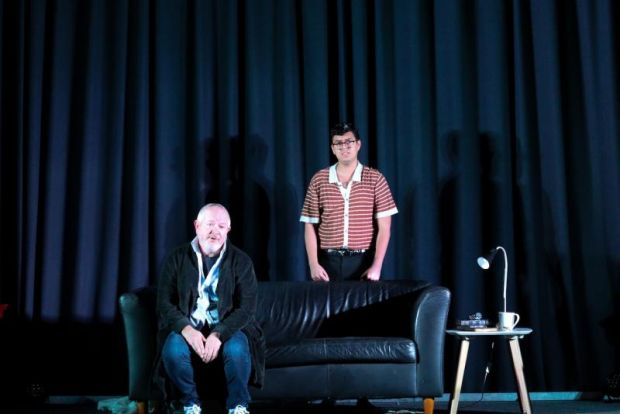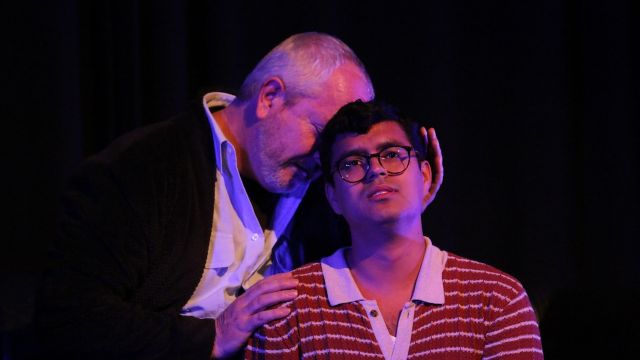For a Look or a Touch
Based on the journal of gay victim Manfred Lewin expressing the horrors of Auschwitz and the infamous 'Paragraph 175' outlawing homosexuality, even after the war, this short one-act opera sets the scene for a survivor of the Holocaust and his reflections on his past romance with a Jewish young man who was one of the unfortunate victims, along with his immediate family, of the horrendous Nazi regime and the gas chambers. It was indeed a tragic time for too many and a fitting setting to stage an opera, historically the perfect musical vehicle to express a vast array of deep emotions.
The evening also included a few choice 'art' songs with a gay theme, including Gershwin and Weill, performed with great gusto by baritone and director of the opera Aidan Hodder, all as a verbal and musical introduction.

In this day and age it's not easy to be original, being constantly surrounded, even bombarded, by a myriad of artists vying to be different, composers and musicians often being more exploratory, transcending tonality in its traditional form both harmonically and melodically. When it comes to stirring the emotions, treading these boards can be a difficult platform, sometimes veering towards the cerebral; and this is what came to mind on first hearing this complex, though technically impressive, opus. There were some high points indeed, for example where the lovers enjoy the 'Golden Years' of Berlin and later with the moving and poignant 'Der Singende Wald', expressing the horrific treatment the prisoners underwent, but there was something theatrically missing in this tumultuous adaptation of such a compelling true story. The most important component of an opera is indeed the music, which can often grow on you, even if it's 'contemporary' in style, so it's important that I stress this is also a comment made from a possible general audience's point-of-view.
Camilo Lopez well-captured the operatic spirit with his performance of mourner Gad Beck's distant lover as a ghost returned to haunt but also invigorate the past, with Bernard Wheaton unfortunately in more of an acting role, looking at his past experience as an operatic tenor, where there was more benevolence in his portrayal rather than a Shakesperian-cum-Wagnerian role with a character deeply transfixed with the past, severely haunted by memories.

The most outstanding performance came from accompanist Mark Connors, having to tackle such a difficult contemporary score, embarking on a journey all over the piano in leaps and bounds, including a terrific and, at times, technically demanding arrangement of Gershwin's 'The Man I Love' earlier in the evening.
The LGBTIQA+ community and its followers would be most supportive of this commendable project and its organizers, bringing a relatively unknown opera with a difference to Brisbane audiences, even providing the opportunity to view in the foyer the signed document by the Queensland Government apologizing for past anti-gay activity.
This minimal production was immaculately presented, including effective lighting and a lyric-monitor, in a most choice and atmospheric venue and we hope to see Voxalis Opera present more productions hopefully with more material and extended performance time. Perhaps it is possible for the company to look at presenting well-known operas, short or excerpts there-of, substituting the traditional roles for male-to-male, or female-to-female, or whatever. For example, I'd love to see Menotti's 'The Telephone' with an all-male/female cast!
Brian Adamson
Subscribe to our E-Newsletter, buy our latest print edition or find a Performing Arts book at Book Nook.

